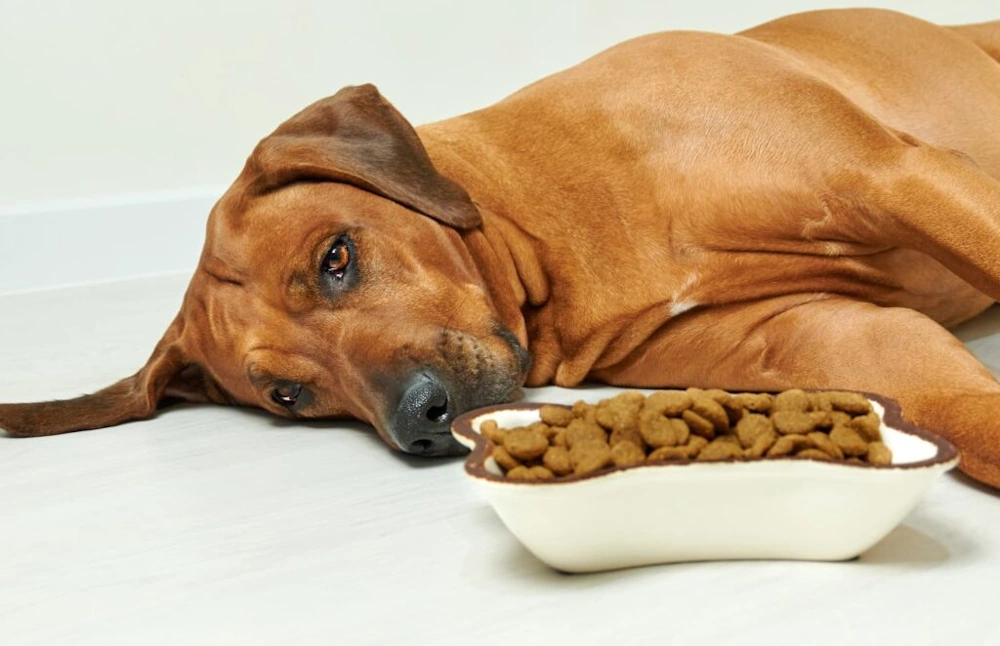When your dog experiences digestive troubles, it can be concerning for any pet owner. Dog digestive issues are among the most common health problems vet in Aurora, IL encounter, ranging from mild upsets to more serious conditions. The good news is that many dog digestive problems can be effectively managed with simple remedies and preventative measures right at home.
This guide will help you understand the most important aspects of canine digestive health, including how to recognize symptoms, implement effective home remedies, and know when professional help is needed. With this knowledge, you’ll be better equipped to provide relief for your pet and potentially prevent future digestive problems.
Common Causes of Dog Digestive Issues
Understanding what triggers digestive problems in dogs is the first step toward providing appropriate relief and prevention. Here are the primary causes:
Dietary indiscretion is perhaps the most common cause of dog digestive issues. Dogs are curious scavengers that often eat things they shouldn’t, from garbage and table scraps to non-food items like socks or toys. These inappropriate items can irritate the digestive tract, leading to vomiting, diarrhea, and discomfort.
Food intolerances and allergies affect many dogs and can develop at any age. Common allergens include beef, dairy, chicken, wheat, and soy. Dog gastrointestinal problems related to food sensitivities typically manifest as chronic diarrhea, occasional vomiting, excessive gas, and sometimes itchy skin or ear infections.
Sudden diet changes frequently trigger digestive upset in dogs. Their gastrointestinal systems are sensitive to abrupt alterations in food. Whether switching brands, formulations, or quantities, transitions should always be gradual to prevent digestive issues.
Infections and parasites represent another significant category. Bacterial infections (like salmonella), viral infections (such as parvovirus), and intestinal parasites (including roundworms, hookworms, and giardia) can all lead to significant digestive problems that may require veterinary treatment.
Stress and anxiety are often overlooked triggers for dog stomach problems. Changes in routine, new environments, separation from owners, or even loud noises can cause nervous stomachs in sensitive dogs. The gut-brain connection in canines is strong, much like in humans.
VETERINARY CARE ALERT:
Sunshine Pet Hospital understands that severe dog digestive issues require immediate attention. If your dog shows concerning symptoms like repeated vomiting, bloody diarrhea, severe lethargy, or signs of abdominal pain, don’t wait, contact us immediately for emergency care.
Common Causes of Dog Digestive Issues
Early identification of digestive problems allows for prompt intervention. Watch for these common signs:
Vomiting can range from occasional regurgitation to severe, repeated episodes. The timing, frequency, and appearance of vomit provide important clues about the underlying cause of dog digestive issues.
Diarrhea is perhaps the most common symptom of dog digestive issues. It varies in severity from slightly soft stool to completely liquid consistency. Particularly concerning are diarrhea containing blood or mucus, diarrhea persisting beyond 24-48 hours, or diarrhea accompanied by other symptoms like lethargy or fever.
Changes in appetite often accompany dog digestion problems. Some conditions cause increased hunger while others lead to complete food aversion. A previously food-motivated dog suddenly showing disinterest in meals warrants attention.
Abdominal discomfort may manifest as a hunched posture, restlessness, whining when touched, or the “prayer position” (front end down, rear end up), which often indicates pain associated with digestive problems.
Lethargy or decreased energy frequently accompanies digestive issues as the body diverts energy toward addressing the gastrointestinal disturbance. A normally active dog becoming notably subdued may be experiencing digestive discomfort.
Effective Home Remedies for Dog Digestive Issues
Many mild to moderate dog digestive issues respond well to simple home interventions. These remedies can provide relief while the digestive system recovers:
Fasting and Bland Diets
Strategic fasting allows the irritated digestive system to rest. For adult dogs with mild dog digestive issues, withholding food (but never water) for 12-24 hours can help reset the gastrointestinal tract. This approach should not be used for puppies, senior dogs, or dogs with certain health conditions without veterinary guidance.
The chicken and rice remedy stands as the gold standard bland diet for dogs experiencing digestive issues. This easily digestible combination provides the necessary nutrition while minimizing digestive effort. Prepare by:
- Boiling plain chicken (removing all skin, fat, and bones)
- Cooking white rice until very soft, using extra water
- Mixing approximately 1/3 chicken with 2/3 rice
- Serving in small, frequent meals (4-6 times daily)
This simple intervention often resolves mild dog digestive issues within 24-48 hours. Once symptoms improve, gradually transition back to regular food over 3-5 days by mixing increasing amounts of regular food with decreasing amounts of the bland diet.
Fiber-Rich Solutions
Pumpkin power has earned its reputation as a remarkable remedy for dog digestive issues. Plain canned pumpkin (not pumpkin pie filling) contains soluble fiber that helps regulate bowel movements in two ways:
- For diarrhea: It absorbs excess water in the intestines, adding bulk to stool
- For constipation: It draws moisture into the digestive tract, softening stool
This dual-action effect makes pumpkin particularly valuable for addressing dog digestive issues. The appropriate dosage depends on your dog’s size:
- Small dogs (under 20 lbs): 1/2 to 1 tablespoon
- Medium dogs (20-60 lbs): 1 to 2 tablespoons
- Large dogs (over 60 lbs): 2 to 4 tablespoons
Sweet potato benefits parallel those of pumpkin for addressing digestive upset. Thoroughly cooked and mashed sweet potato provides similar fiber content with a different nutrient profile. Some dogs prefer its slightly sweeter taste, making it an excellent alternative when addressing mild dog digestive problems.
Probiotics and Digestive Support
Probiotic supplementation helps restore beneficial bacteria in the gut microbiome, which often becomes imbalanced during episodes of dog digestive issues. These beneficial microorganisms support proper digestion, nutrient absorption, and immune function.
Natural sources include plain, unsweetened yogurt with live cultures and kefir, though commercial canine probiotics typically provide higher concentrations and more diverse strains specifically selected for addressing dog gut health concerns.
Bone broth offers hydration along with beneficial nutrients and is often appealing even to dogs with decreased appetites due to digestive issues. The gelatin in bone broth coats and soothes the digestive tract while providing easily absorbable nutrition. Prepare homemade bone broth by simmering bones (avoiding onions and garlic) for 24+ hours, or use commercially available bone broths formulated specifically for pets.
Hydration Strategies
Maintaining proper hydration is crucial when managing dog digestion problems, particularly those involving diarrhea or vomiting, which can quickly lead to dehydration.
Encouraging water intake may require creativity when digestive issues affect your dog’s normal drinking habits. Try:
- Offering fresh water frequently in clean bowls
- Adding ice cubes to make drinking more interesting
- Using a pet water fountain
- Flavoring water with a small amount of low-sodium chicken broth (no onions or garlic)
Recognizing dehydration is essential for timely intervention in dogs. Check for signs of digestive problems such as:
- Dry, tacky gums
- Loss of skin elasticity (skin tented over the shoulders is slow to return to normal)
- Sunken eyes
- Lethargy or weakness
- Concentrated urine
Ice chips provide a way to introduce small amounts of water that won’t overwhelm a sensitive stomach. This approach is particularly useful when vomiting is among the digestive issues you’re addressing.
PERSONALIZED CARE FOR CHRONIC DIGESTIVE PROBLEMS:
Sunshine Pet Hospital provides tailored treatment for recurring digestive problems in dogs. Our approach combines veterinary care, nutrition therapy, and supplements.

When Professional Care is Necessary
While many mild digestive issues respond well to home remedies, certain situations require veterinary attention. Recognizing these scenarios ensures your dog receives appropriate care when dog digestive issues exceed what can be managed at home.
Emergency situations requiring immediate veterinary care include:
- Suspected ingestion of toxic substances or foreign objects
- Severe, repeated vomiting (especially if projectile or containing blood)
- Bloody diarrhea or black, tarry stool
- Severe abdominal pain, bloating, or a distended abdomen
- Collapse, extreme weakness, or unresponsiveness
- Refusal to eat or drink for more than 24 hours
- Signs of significant dehydration despite hydration efforts
When home remedies aren’t working: If dog digestive issues persist beyond 24-48 hours despite implementing appropriate home care, veterinary evaluation is warranted. Similarly, if symptoms initially improve but then return or worsen, professional assessment becomes necessary.
Chronic or recurrent issues: Dog stomach problems that follow a pattern, occurring regularly after certain activities, foods, or in specific situations should be documented and discussed with your vet in Aurora, IL. These patterns may indicate underlying conditions requiring specific diagnosis and treatment.
Special population considerations: Puppies, senior dogs, pregnant dogs, and those with pre-existing health conditions have less physiological reserve and may deteriorate more quickly with digestive issues. For these vulnerable populations, dog digestive issues warrant a lower threshold for seeking veterinary care.
Preventative Strategies for Digestive Health
Regular feeding schedule: Consistent meal times help regulate the digestive system and prevent many digestive problems. Most adult dogs do well with two meals daily, while puppies may require more frequent feeding. Avoid free-feeding (leaving food available all day), which can lead to irregular digestive patterns and potential overeating.
Gradual diet transitions: When changing your dog’s food, mix increasing amounts of new food with decreasing amounts of the current food over 7-10 days. This gradual approach allows the digestive system to adapt to the new formulation, preventing upset stomach in dogs related to sudden changes.
Quality food selection: Choose dog food appropriate for your pet’s age, size, activity level, and any specific health needs. Quality commercial diets formulated to meet AAFCO guidelines ensure nutritional completeness and are less likely to cause digestive problems than poorly formulated options.
Portion control: Overfeeding stresses the digestive system and can lead to Dog digestion problems. Follow the feeding guidelines on the pet food packaging as a starting point, but adjust based on your dog’s metabolism and activity level to maintain ideal body condition.
Regular parasite prevention: Many dog gastrointestinal problems stem from intestinal parasites. Follow your veterinarian’s recommendations for deworming and preventative medications to protect against worms and other parasites that can cause digestive problems.
Stress management: Implement techniques such as maintaining routine, providing adequate exercise, mental stimulation, and creating safe spaces for your dog during potentially stressful situations like thunderstorms or house guests.
When choosing which approach is best for your dog’s digestive issues:
- For mild, occasional digestive upset, home remedies are often sufficient
- For chronic or recurring issues, veterinary diagnosis and potentially prescription products provide targeted treatment
- For preventative care, a combination approach may be ideal. Healthy feeding practices supplemented by carefully selected commercial products as needed
A Holistic Approach to Managing Dog Digestive Issues
Addressing dog digestive issues requires a combination of careful observation, appropriate home care, preventative measures, and knowing when to seek professional help. By understanding the causes and signs of digestive problems, implementing suitable remedies, and maintaining preventative practices, you can significantly improve your dog’s digestive health and overall quality of life.
Creating a “digestive first aid kit” with items like plain canned pumpkin, white rice, bone broth, and a quality probiotic ensures you’re prepared to respond quickly to minor dog digestive problems. Combined with regular preventative care and a wholesome diet appropriate for your dog’s specific needs, these strategies form a comprehensive approach to maintaining optimal digestive health for your canine companion.
Remember that while many dog digestive issues can be successfully managed at home, your vet in Aurora, IL remains your best resource for persistent or severe problems. Establishing a partnership with a trusted veterinary practice ensures that when simple remedies aren’t enough, your dog receives the specialized care they need to resolve digestive issues and return to optimal health.
With proper attention to your dog’s digestive health, you can help ensure they enjoy a comfortable, active life free from the discomfort of digestive issues. The time and effort invested in understanding and addressing your dog’s digestive needs will be rewarded with a happier, healthier canine companion for years to come.
COMPREHENSIVE DIGESTIVE HEALTH PROGRAM
Sunshine Pet Hospital provides tailored care for dogs with chronic digestive issues. Our three-step plan includes testing, treatment, and monitoring.


